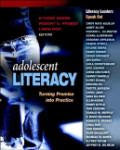One thing that caught my eye while reading the introduction is that the organization of the book reflects its philosophical stance that literary instruction and development is not subject specific -- accordingly, no chapter focuses on a single content area. As the editor notes, "In the same way that we want learners reading a variety of texts to synthisize information, we want you to do the same." I like how they are modelling the process that we would apply in our classrooms. To me, it suggests a well-considered and thoughtful approach to creating this anthology, one with a clear philosophical direction, and it bodes well for the chapters/articles to come.
Secondly, in a letter sent to contributing authors, the editors note that jobs in the very near future (one can argue, now, in fact) require a skill set that includes "creating, synthesizing, and evaluating." They go on to state that individuals who hold such skills possess "ingenuity, imagination, and empathy... take risks and work cooperatively." This passage reminds me very much of statements found in the Ontario curriculum, particularly for the elementary panel. Strateiges like portfolios and cooperative learning and cross curriculum activities seem to be more the norm in grammar school, but as students move to the secondary panel, many of the strategies that develop and encourage the skill set noted above seem to vanish. I hope that the chapters to come support or demonstrate the successful integration of various strategies that secondary school teachers can explore with their classes.
Finally, reflecting on Sharon's posting, there are many different theories in the great field of literary criticism, and many different approaches to understanding a text. In fact, some theories question the definition of what a text is -- novel, short story, poem, menu, road map, newspaper, etc. What is deeply exciting now is the possibilities of differentiated instruction along with the introduction of differntiated texts. I hope at least one chapter explores these possibilities.
Friday, August 8, 2008
Subscribe to:
Post Comments (Atom)

1 comment:
When I did my masters in education, I examined Louise Rosenblatt's reading theory which, in a nutshell, states that readers interpret text according to the prior knowledge they bring to the reading - which means that there are an infinite number of ways that meaning is constructed depending upon the reader. While this is not to say that anything goes when interpreting a text, it seems to me that we need to guide our students and help them construct meaning through a variety of strategies (especially through oral language)and then challenge them to interpret texts in different ways. I am hoping that this anthology will demonstrate the best ways to do this.
Post a Comment